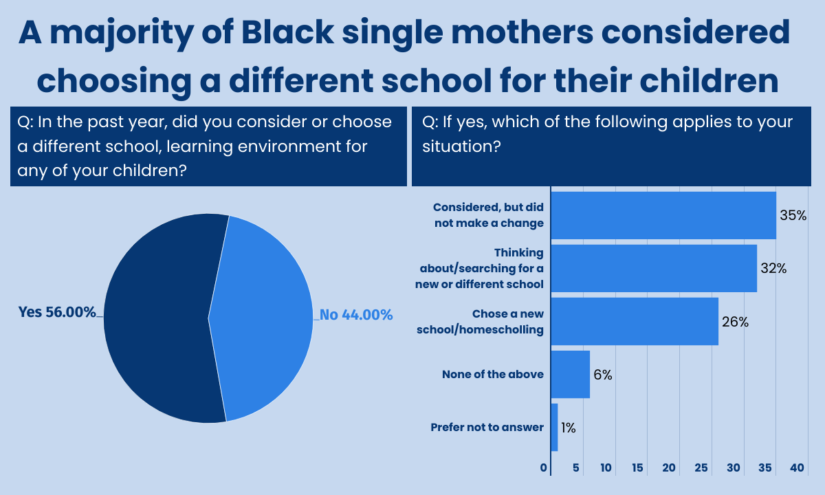During this summer, a team of students from MIT embarked on a journey to the sou …
Poll reveals that black single mothers advocate for increased school choice and plan to vote accordingly
Carlos Changemaker

A new survey reveals that nearly 70% of Black single mothers with school-aged children believe the country is going in the wrong direction. Additionally, almost 90% of them don’t think that the traditional approach to public school meets their children’s needs. In the past year, 56% have contemplated changing their kids’ schools.
The survey, which included 504 middle- to low-income Black single moms, was commissioned by The Current Project. Alisha Gordon, the organization’s founder and a Black single mother herself, emphasized the significance of strong public school systems and economic security in the upcoming presidential election.
Gordon identified three main takeaways from the survey:
- Black single moms desire more school options:
Approximately 70% of the surveyed moms have children attending traditional public schools. An overwhelming majority of 87% believe that a one-size-fits-all approach is ineffective. They value attention to their children’s special needs, academics, test scores, and the cultural, ethnic, or racial composition of schools. More than half (56%) have considered switching schools for their children, although only 26% have actually made a change or decided to homeschool.
“Public school choice is viewed as an interrupter for the social, economic, and educational disparities that children of Black single mothers often experience,” explained Gordon. “Allowing these mothers to tailor their children’s educational experience based on their individual needs can help address these inequities.”
60% of respondents strongly agreed that they were more likely to vote for a candidate who supports expanding parents’ choices in school selection. The survey indicated that respect for their child’s gender identity, class sizes, and the availability of gifted and talented programs and after-school child care were extremely important to this group.
- Black single mothers want their concerns acknowledged by elected officials:
Black women, who constituted a significant voting bloc in the 2020 election with 93% support for President Biden, remain uncertain about the direction the country is taking. Despite this, 60% of the surveyed mothers expressed their intention to participate in the upcoming primary elections. They believe that the majority of elected officials are not adequately addressing their issues.
The survey found that nearly all the moms polled have faced difficulties related to inflation and the rising cost of living. Many of these women earn too much to qualify for certain government assistance programs but still struggle to cover basic needs.
Gordon stressed the importance of taking Black single mothers seriously and supporting their needs, concerns, and aspirations. She emphasized the impact of their well-being on the overall thriving of society, considering their responsibility for millions of children.
- School leaders must find diverse ways to engage with single parents:
Nearly 75% of the Black moms surveyed reported moderate to high stress levels. Gordon explained that single parents are often mislabeled as disengaged due to factors like working multiple jobs, which aren’t taken into account. To enhance the engagement of single moms, schools could appoint parent advocates and liaisons. Additionally, adopting a community school model that offers after-school and work-hour meeting times can facilitate better communication. Efforts such as providing healthcare services and a food pantry for students can also make a difference.
Gordon proposed offering parent surveys through platforms like Google Classroom and Google Forms to encourage communication and gather feedback. This allows schools to ask, listen, respond, and take action even when in-person attendance is not possible.
The survey, conducted between November 18 and December 12, 2023, by the research group Evaritus, is the first of its kind to explore the attitudes of this demographic of Black women toward the country and school choice. The margin of error for the survey is +/- 4.36%.


